
Sgt. Pepper's Lonely Hearts Club Band is the eighth studio album by the English rock band the Beatles. Released on 26 May 1967, Sgt. Pepper is regarded by musicologists as an early concept album that advanced the roles of sound composition, extended form, psychedelic imagery, record sleeves, and the producer in popular music. The album had an immediate cross-generational impact and was associated with numerous touchstones of the era's youth culture, such as fashion, drugs, mysticism, and a sense of optimism and empowerment. Critics lauded the album for its innovations in songwriting, production and graphic design, for bridging a cultural divide between popular music and high art, and for reflecting the interests of contemporary youth and the counterculture.
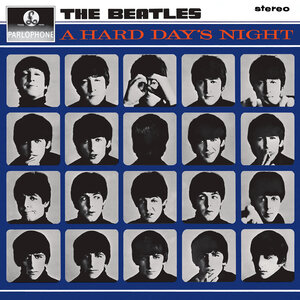
A Hard Day's Night is the third studio album by the English rock band the Beatles, released on 10 July 1964 by Parlophone, with side one containing songs from the soundtrack to their film of the same name. The American version of the album was released two weeks earlier, on 26 June 1964 by United Artists Records, with a different track listing that included selections from George Martin's film score. In contrast to the Beatles' first two albums, all 13 tracks on A Hard Day's Night were written by John Lennon and Paul McCartney, showcasing the development of their songwriting partnership.
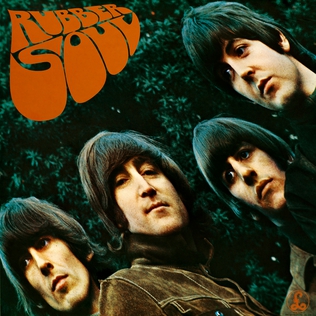
Rubber Soul is the sixth studio album by the English rock band the Beatles. It was released on 3 December 1965 in the United Kingdom on EMI's Parlophone label, accompanied by the non-album double A-side single "Day Tripper" / "We Can Work It Out". The original North American release, issued by Capitol Records, contains ten of the fourteen songs and two tracks withheld from the band's Help! album. Rubber Soul was described as an important artistic achievement by the band, meeting a highly favourable critical response and topping sales charts in Britain and the United States for several weeks.

The Beatles, also referred to colloquially as the White Album, is the ninth studio album and only double album by the English rock band the Beatles, released on 22 November 1968. Featuring a plain white sleeve, the cover contains no graphics or text other than the band's name embossed. This was intended as a direct contrast to the vivid cover artwork of the band's previous LP Sgt. Pepper's Lonely Hearts Club Band (1967). The Beatles is recognised for its fragmentary style and diverse range of genres, including folk, country rock, British blues, ska, music hall, proto-metal and the avant-garde. It has since been viewed by some critics as a postmodern work, as well as one of the greatest albums of all time.

Decca Records is a British record label established in 1929 by Edward Lewis. Its US label was established in late 1934 by Lewis, Jack Kapp and Milton Rackmil, who later became American Decca's president too. In 1937, anticipating Nazi aggression leading to World War II, Lewis sold American Decca, and the link between the UK and US Decca label was broken for several decades. The British label was renowned for its development of recording methods, while the American company developed the concept of cast albums in the musical genre.
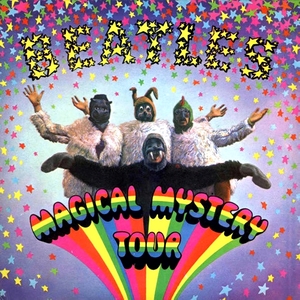
Magical Mystery Tour is a record by the English rock band the Beatles that was released as a double EP in the United Kingdom and an LP in the United States. It includes the soundtrack to the 1967 television film of the same name. The EP was issued in the UK on 8 December 1967 on the Parlophone label, while the Capitol Records LP release in the US and Canada occurred on 27 November and features an additional five songs that were originally released as singles that year. In 1976, Parlophone released the eleven-track LP in the UK.

"I Am the Walrus" is a song by the English rock band the Beatles from their 1967 television film Magical Mystery Tour. Written by John Lennon and credited to Lennon–McCartney, it was released as the B-side to the single "Hello, Goodbye" and on the Magical Mystery Tour EP and album. In the film, the song underscores a segment in which the band mime to the recording at a deserted airfield.
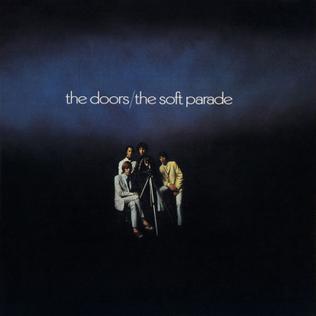
The Soft Parade is the fourth studio album by American rock band the Doors, released on July 18, 1969, by Elektra Records. Most of the album was recorded following a grueling tour during which the band was left with little time to compose new material. Record producer Paul A. Rothchild recommended a total departure from the Doors' first three albums: develop a fuller sound by incorporating brass and string arrangements provided by Paul Harris. Lead singer Jim Morrison, who was dealing with personal issues and focusing more on his poetry, was less involved in the songwriting process, allowing guitarist Robby Krieger to increase his own creative output.

The Apples in Stereo, styled as The Apples in stereo, are an American pop/rock band associated with Elephant 6 Collective, a group of bands also including Neutral Milk Hotel, The Olivia Tremor Control, Elf Power, Of Montreal, and Circulatory System. The band is largely a product of lead vocalist/guitarist/producer Robert Schneider, who writes the majority of the band's music and lyrics. Currently, The Apples in Stereo also includes longstanding members John Hill and Eric Allen (bass), as well as more recent members John Dufilho (drums), John Ferguson (keyboards), and Ben Phelan (keyboards/guitar/trumpet).
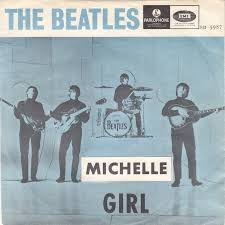
"Michelle" is a song by the English rock band the Beatles from their 1965 album Rubber Soul. It was composed principally by Paul McCartney, with the middle eight co-written with John Lennon. The song is a love ballad with part of its lyrics sung in French.

Live Peace in Toronto 1969 is a live album by the Plastic Ono Band, released in December 1969 on Apple Records. Recorded at the Toronto Rock and Roll Revival festival, it was the first live album released by any member of the Beatles separately or together. John Lennon and his wife Yoko Ono received a phone call from the festival's promoters John Brower and Kenny Walker, and then assembled a band on very short notice for the festival, which was due to start the following day. The band included Eric Clapton, Klaus Voormann, and drummer Alan White. The group flew from London, and had brief unamplified rehearsals on the plane before appearing on the stage to perform several songs; one of which, "Cold Turkey", was first performed live at the festival. After returning home, Lennon mixed the album in a day.

"I'm Only Sleeping" is a song by the English rock band the Beatles from their 1966 studio album Revolver. In the United States and Canada, it was one of the three tracks that Capitol Records cut from the album and instead included on Yesterday and Today, released two months before Revolver. Credited as a Lennon–McCartney song, it was written primarily by John Lennon. The track includes a backwards lead guitar part played by George Harrison, the first time such a technique was used on a pop recording.
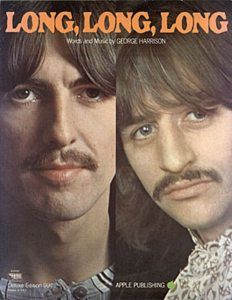
"Long, Long, Long" is a song by the English rock band the Beatles from their 1968 album The Beatles. It was written by George Harrison, the group's lead guitarist, while he and his bandmates were attending Maharishi Mahesh Yogi's Transcendental Meditation course in Rishikesh, India, in early 1968. Although Harrison later stated that he was addressing God in the lyrics, it is the first of his compositions that invites interpretation as both a standard love song and a paean to his deity.
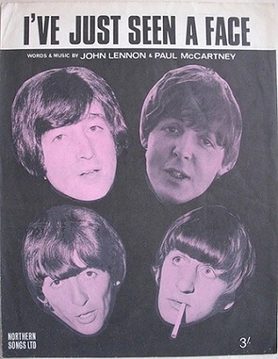
"I've Just Seen a Face" is a song by the English rock band the Beatles. It was released in August 1965 on their album Help!, except in North America, where it appeared as the opening track on the December 1965 release Rubber Soul. Written and sung by Paul McCartney, the song is credited to the Lennon–McCartney partnership. The song is a cheerful love ballad, its lyrics discussing a love at first sight while conveying an adrenaline rush the singer experiences that makes him both enthusiastic and inarticulate.

"I Call Your Name" is a song recorded by the English rock band the Beatles and credited to Lennon–McCartney. It was written primarily by John Lennon, with assistance from Paul McCartney. It was released in the US on The Beatles' Second Album on 10 April 1964 and in the UK on the Long Tall Sally EP on 19 June 1964. On 7 March 1988, the song appeared on Past Masters, a compilation album that includes every song commercially released by the band that was neither included on the 12 UK studio albums nor the US Magical Mystery Tour LP, meaning that "I Call Your Name" appeared for the first time on a core catalogue album.

"Baby, You're a Rich Man" is a song by the English rock band the Beatles that was released as the B-side of their "All You Need Is Love" single in July 1967. It originated from an unfinished song by John Lennon, titled "One of the Beautiful People", to which Paul McCartney added a chorus. It is one of the best-known pop songs to make use of a clavioline, a monophonic keyboard instrument that was a forerunner to the synthesizer. Lennon played the clavioline on its oboe setting, creating a sound that suggests an Indian shehnai. The song was recorded and mixed at Olympic Sound Studios in London, making it the first of the Beatles' EMI recordings to be entirely created outside EMI Studios.

Safe in Sound is a 2005 studio album by pop singer-songwriter Jim Boggia. A track from the album, Live the Proof was featured in an ad for the 2008 BlackBerry campaign.
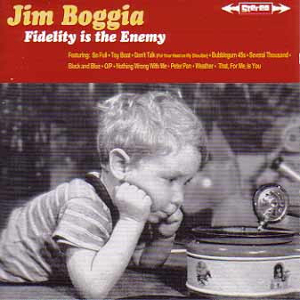
Fidelity Is the Enemy is a 2001 studio album by pop singer-songwriter Jim Boggia. A track from the album, "Several Thousand" was featured in the ABC television show Men in Trees. The song was also recorded by American Idol contestant Constantine Maroulis for his debut album.
Julian Coryell is an American guitarist, singer, songwriter, and producer.
Progressive pop is pop music that attempts to break with the genre's standard formula, or an offshoot of the progressive rock genre that was commonly heard on AM radio in the 1970s and 1980s. It was originally termed for the early progressive rock of the 1960s. Some stylistic features of progressive pop include hooks and earworms, unorthodox or colorful instrumentation, changes in key and rhythm, experiments with larger forms, and unexpected, disruptive, or ironic treatments of past conventions.

















